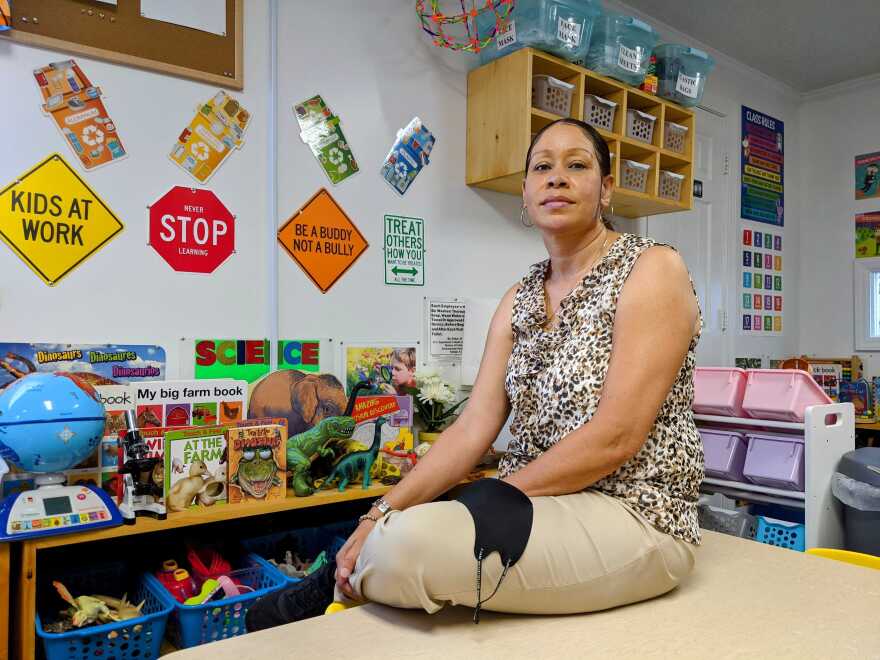As David Farris goes about his week, he keeps hearing the same concerns from employers.
Farris is President and CEO of the Rocky Mount Chamber of Commerce, and he knows about every major employer in that metro area — from Cummins engines to Sara Lee desserts.
“I get emails, I get texts, I bump into someone on the street, or the meeting or at the YMCA and it's, 'I can't find employees,’ or they tell me they don't have daycare, childcare,'” Farris said.
The pandemic has put the childcare industry in crisis. Enrollment has fallen, some centers have closed, and families seeking daycare to get back to work struggle to pay the high costs. Leaders at the Rocky Mount Area Chamber of Commerce are keenly aware of the need.
Business leaders in the small, industrial city say the lack of affordable childcare is holding back local manufacturers, which have higher levels of unemployment than other sectors according to the latest report by the Bureau of Labor Statistics.
With the additional pressures brought on by the pandemic, the Rocky Mount Area Chamber of Commerce has taken a special interest in helping childcare centers start up or get back on their feet.
The organization is offering daycare providers discounted rates on chamber membership to help them navigate the ins and outs of starting a business, while connecting them to resources and potential clients.
Farris is especially excited about a new 24-hour childcare center that opened this year, Molly's Daycare Center. Third Shift Childcare Serves Essential Workers

With more than 21 years in the childcare industry, Evie Hart opened her new business in February, naming it after her mother.
“Normally, I'm here from (7 a.m.) in the morning to (7 p.m.) in the evening and I'm here every weekend,” Hart explains as she shows off brightly colored rooms while toddlers stir on their cots.
The scene is very different at 11 p.m., when parents drop off their kids and head to their third shift jobs.
“You would think most kids coming in that time of night [would] come in sleeping, you know, tired, worn out. It's the total opposite,” Hart said. “When they come through the door, they are alive, they are woke, they are ready to get into some activities.”
Staying open 24 hours a-day, seven days per-week is hard work, but Hart says it fills a need. Her third shift clients include moms and dads who work in factories, hospitals and stores that stay open all night.
“Actually, we had more kids on third shift than we did anything when we first started out. I served more children at night than I did during the day,” Hart said.
But because she had trouble hiring staff for late at night, and had to work the shift herself in addition to other duties, she temporarily discontinued it.
Now Molly's Daycare has open slots to take in children any shift, including third.
Childcare Advocates Say Daycare Centers Need Support To Be Affordable and Sustainable
So why do employers say the need for daycare is great, but childcare centers still have open slots?
Kimberly Hickerson of the Down East Partnership for Children says, “It's the cost.”
Hickerson works as a childcare advocate, helping parents navigate their options. Childcare can easily cost as much as college tuition, and parents seeking daycare to get a new job need enough savings to pay for the first month of care.
Despite the high cost for families, daycare centers are just scraping by. Many are struggling to hire teachers because the pay is low. Less than half of centers offer benefits like health insurance.
Hickerson, citing a report by the Childcare Services Association for Edgecombe County, says 38% "of the teaching staff are on public assistance.”
The good news is that North Carolina is receiving $1.3 billion in federal relief for childcare. Childcare advocates across North Carolina are hoping the state will invest COVID relief funds strategically to support daycare providers well beyond this year.
“It's the cost.”Kimberly Hickerson
Lawmakers must decide how to spend those funds, and advocates are calling on them to raise the rate that childcare centers receive for every child from a low-income household whose care is subsidized by the state.
Currently, neither the House nor the Senate’s budget plans use the funding to raise subsidy rates, which are based on a 2015 market study and haven’t been updated since. According to the advocacy group NC Child, the rates no longer cover the full cost of care, so childcare centers can actually lose profit by accepting clients with state subsidies.
“All of this is to provide good quality childcare for children and in order to do that, you have to have funding to support the changes that need to be made,” Hickerson said.
Hickerson points to the need to pay childcare teachers more to keep centers fully staffed.
Evie Hart pays her employees about $8 an hour and all have associate’s degrees plus other specialized training. She is unable to offer benefits at this time, although she did offer them years ago when rates went further toward covering her expenses.
David Farris says he is also talking to employers about pitching in more to offer childcare benefits for employees, and with the current climate, employers are becoming more receptive to the idea.
“We're putting it on the table,” Farris said. “And we're not getting what you might have gotten two or three or four years (ago), you know, ‘No, that's not my problem.’”







